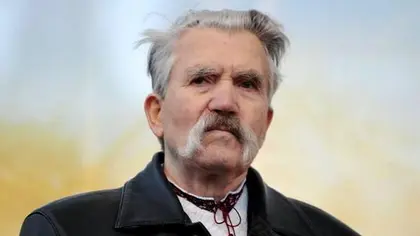Soviet dissident and Ukrainian politician Levko Lukyanenko died on July 7 at the age of 89 in a Kyiv hospital after an illness.
A dissident who spent years in Soviet prison, Lukyanenko was known as a co-founder of the Ukrainian Helsinki Group, a human rights organization, and as the author of the Declaration of Ukrainian Independence that the Ukrianian parliament adopted on Aug. 24, 1991, as the Soviet Union was disintegrating. He also was the leader of the Ukrainian Republican Party twice.
- Obtain the freshest war in ukraine update from the Kyiv Post's daily news coverage today.
- View the most up-to-date Ukraine news articles published today.
JOIN US ON TELEGRAM
Follow our coverage of the war on the @Kyivpost_official.
He is survived by his wife, Nadiya Bugayevska.
A fighter for independence
Lukyanenko was an opponent of the Soviet regime and a staunch Ukrainian nationalist. In his last interview to Ukrainska Pravda published in April, he recalled the day he became disappointed with the Soviet government.
It was February 1956, after the 20th Congress of the Communist Party. He said he witnessed injustice and hunger from which the Ukrainian people were suffering.
“I stopped pretending I was a party member,” said Lukyanenko, who had been working within the Soviet government up until that point after receiving a law degree from Moscow State University.
“Arrest didn’t scare me anymore. I didn’t want to give the moskals (Ukrainian slur for Muscovites) a basis to say that they defeated UPA (Ukrainian Insurgent Army in World War II) and Ukrainian People’s Republic and now Ukraine fell on its back,” he told Ukrainska Pravda. “I decided: I will continue to carry blue-and-yellow flag of fight. And if I die, another man will pick it up and carry on. Until Ukraine is independent.”
In 1958, he and two other activists Stepan Virun and Vasyl Lutskivyi founded a clandestine party of Ukrainian workers and peasants. At that time, he led a double life: He was appointed a staff propagandist to the local Communist party branch in Lviv Oblast.
In 1961, a Lviv court sentenced Lukyanenko to execution by firing squad upon his conviction for “nursing an idea of separation of Ukraine from the USSR, undermining the credibility of the Communist Party, and slandering the theory of Marxism and Leninism.”
The death sentence was soon replaced by 15 years in a labor camp.
Two years after he had been freed in 1976, he was on trial again. This time, he was declared a dangerous offender. In total, Lukyanenko spent 27 years in Soviet labor camps and prisons.
Lukyanenko’s dream of Ukrainian independence came true in 1991. At that time, he was already leading the newly founded Republican Party.
The idea to declare Ukraine a sovereign state on August 24, 1991 came to his mind the day before, he told Ukrainska Pravda.
“Had I kept silent, we would have passed the laws of the Ukrainian Soviet Socialist Republic,” he said.
Lukyanenko ran for president in 1991 but finished the third having lost to Leonid Kravchuk. He also served as a member of Verkhovna Rada.
Prime Minister Volodymyr Groysman and President Petro Prooshenko mourned Lukyanenko’s death in messages on social media.
Accusations of racism
Despite his huge contribution to the Ukrainian statehood, Lukyanenko often expressed controversial views on race.
In a 2008 article for Personal-Plus magazine, he wrote about the preservation of Ukrainians as “a white race” and claimed that every Ukrainian has a personal responsibility not to fraternize with other races.
“Do we, Ukrainians — people of the white race, want to become different from who we were before, for instance, black, yellow, red? Cases of marriages of Ukrainian women to representatives of other races prove that not everyone values their white race,” he wrote.
He suggested that if a Ukrainian wanted to marry a person of a different race they would have to leave Ukraine and surrender their citizenship. He said he respected other races and supported developing economic relationship between Ukraine and their countires. However, he was against having “non-whites” in Ukraine.
“Ukraine will avoid racial issues if it doesn’t allow people of color to our national house. Ukraine didn’t have colonies in Africa or Asia so it doesn’t have moral obligations like other European countries.”
The publication the article appeared in, Personal Plus, was also subject to criticism for its anti-Semitic propaganda. It was published by the Interregional Academy of Personnel Management.
In 2005, Lukyanenko spoke at a conference in Kyiv called “Zionism as the biggest threat to contemporary civilization” which was organized by the infamous academic institution.
Lukyanenko spoke alongside former Ku Klux Klan member David Duke at the event, earning him a reproach in a Kyiv Post editorial at the time.
You can also highlight the text and press Ctrl + Enter




